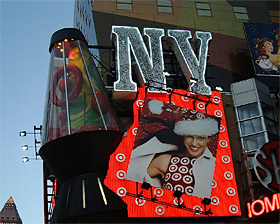 |
 |
 |
 Entertainment | October 2005 Entertainment | October 2005  
New York City Sets Up Commission to Build Hispanic Media Capitol of the World
 Juliette Fairley - Hispanic Business Juliette Fairley - Hispanic Business


| | One strategy to attract companies is to create a Latin "entertainment district," possibly in uptown Manhattan. |
Most states and large cities have film commissions, but New York City has created a commission specifically to attract Hispanic-oriented productions, events, and companies. Launched in 2003 by Mayor Michael Bloomberg and entertainer Jennifer Lopez, the Latin Media & Entertainment Commission (LMEC) promotes media produced for and by the city's 2.8 million Hispanics.

"We have a large Hispanic community that is the most diverse in the world. We are trying to attract media companies that want to serve Latinos from the Caribbean, Mexico, Central and South America," says Elilzabeth Caldas, the commission's executive director.

LMEC success stories include support of the New York International Latino Film Festival and the Latin Alternative Music Conference. Recently, the LMEC awarded an official city proclamation to New York-based LatCom Communications Inc., the Hispanic-owned events and publishing company responsible for the iCaramba College Tour and iCaramba U. college lifestyle magazine. The city's proclamation honored LatCom for producing a 13-week Hispanic comedy event series.

"The proclamation was a big deal for our client Jack Daniels because they underwrite our whole [comedy] series and they were referenced in the proclamation. It made them feel better about what they are doing with us," says LatCom CEO David Chitel.

"It was a huge validation because we started from nothing four years ago," he says, noting that conglomerate Davidson Media Group recently acquired a majority share in the company.

LMEC's 36 commissioners come from Hispanic and mainstream media, cultural groups, and the advertising and financial services sector. Ms. Lopez serves as spokes-person for the commission and Robert De Niro is honorary co-chair. Other high-profile members include Antonio Banderas; Jimmy Smits; Loews Hotels CEO Jonathan Tisch; Miss Universe 2003 Amelia Vega; Andrew Lack, CEO of Sony BMG Music Entertainment; and former Goya Foods COO Andy Unanue.

According to Mr. Unanue, there's plenty of money to be made from Hispanic culture. While he owns 35 percent of Goya, he invested in a more events-related venture when he opened AER Lounge in December 2004. The trendy lounge caters to a chic clientele in the Tribeca neighborhood of lower Manhattan. "Like the commission, my new nightclub and restaurant business helps people forge into [the] Hispanic industry and get into their pocketbooks. The commission expands Hispanic culture in New York City, which helps my business and any business in the city," explains Mr. Unanue.

Independent Feature Project Executive Director Michelle Byrd is another LMEC commissioner.

"Independent film is about diversity and independent voices. So it's not unusual that [the LMEC] would invite someone like me, who is running an organization dedicated to supporting independent films. We also have a number of diversity programs of our own," says Ms. Byrd.

But after coming up with the idea to create a $100,000 lab for Latin filmmakers, Ms. Byrd ran into the artist's nightmare – no money, a recurrent problem at the LMEC. "The lab was going to bring together writers, directors, and producers for mentoring, but there was no cash funding through the commission," she recalls. "We've had to take this lab model for Latinos and stretch it out to a more comprehensive program covering other minorities in order to find funding interest."

But Mr. Unanue, who chairs the LMEC's subcommittee on events, hopes to put together private money to bankroll Hispanic culture.

"On my subcommittee, we try to find resources to help bring big events to New York. It's great if the government can help but a lot of this needs to be funded by the private sector," says Mr. Unanue.

He adds that the government should contribute incentives and support rather than cash. "To bring in Latin publishing companies or the Latin GRAMMYs, we will need the government to step in and provide motivation for these entities to move here."

"The private sector can't do that. That's where working in unison is important."

But LMEC's Ms. Caldas doesn't expect Hispanic media to get any special treatment. "We will make Latino companies aware of tax incentives available to everyone and there are private groups that want to work with us in investing private dollars in growing Latin media opportunities, but we are not sure how it's going to come out," she says.

One strategy to attract companies is to create a Latin "entertainment district," possibly in uptown Manhattan.

"We are working with the New York City Economic Development Corporation," Ms. Caldas explains, "to figure out ways to recruit and grow Latin media and entertainment businesses and re-establish our great city as the capital of Latin media and entertainment, as it once was during the early days of the salsa music movement."

Mr. Chitel hopes the city will do more than issue proclamations and provide networking opportunities – especially since New York is the capital of global finance. "An award is one thing, but it's another thing to help build the businesses that will represent the future," he opines. "I think it would be interesting to the commission that the city be involved with start-up companies, perhaps creating a venture capital-backed fund to plug Latino entrepreneurs into the resources they need that would help them grow."

Until then, investors, entrepreneurs, filmmakers, and consumers can tap into New York Hispanic culture by visiting the LMEC Web site (www.nyc.gov/html/lmec), which provides an events calendar, a directory of cultural organizations and nonprofits, a night-life guide, and a media company directory.

It's a first step in Ms. Caldas's stated goal of making New York the "Latin media and entertainment capital of the world." | 
 | |
 |



